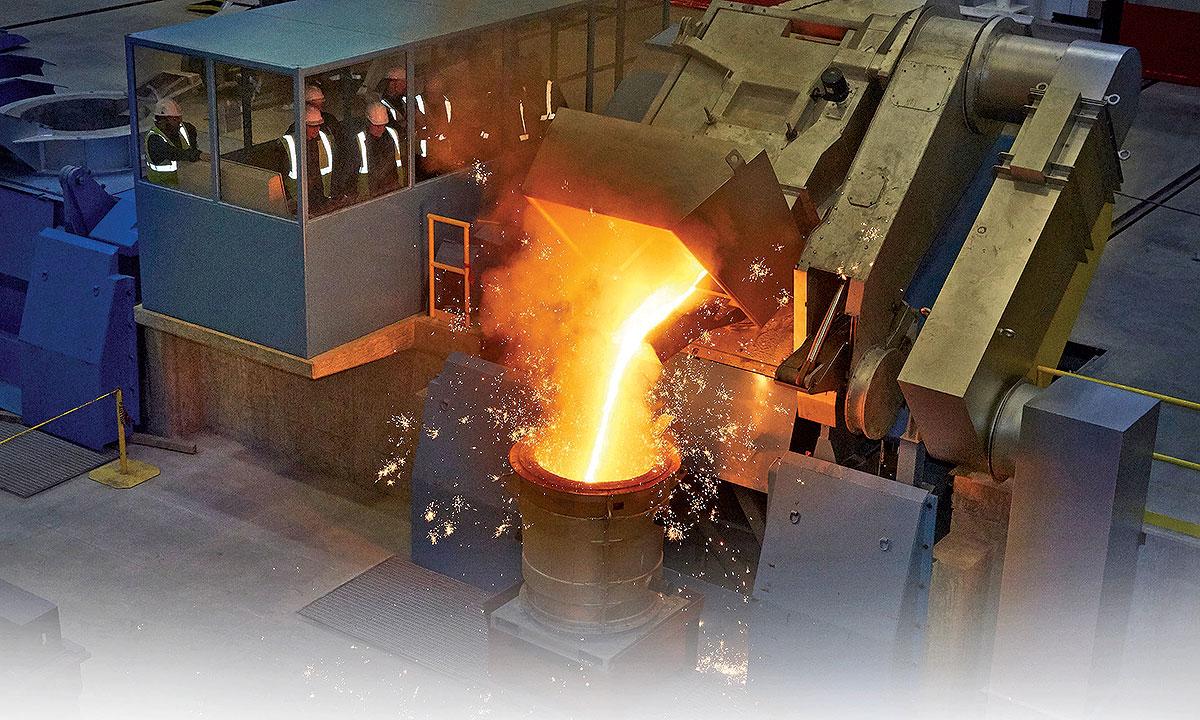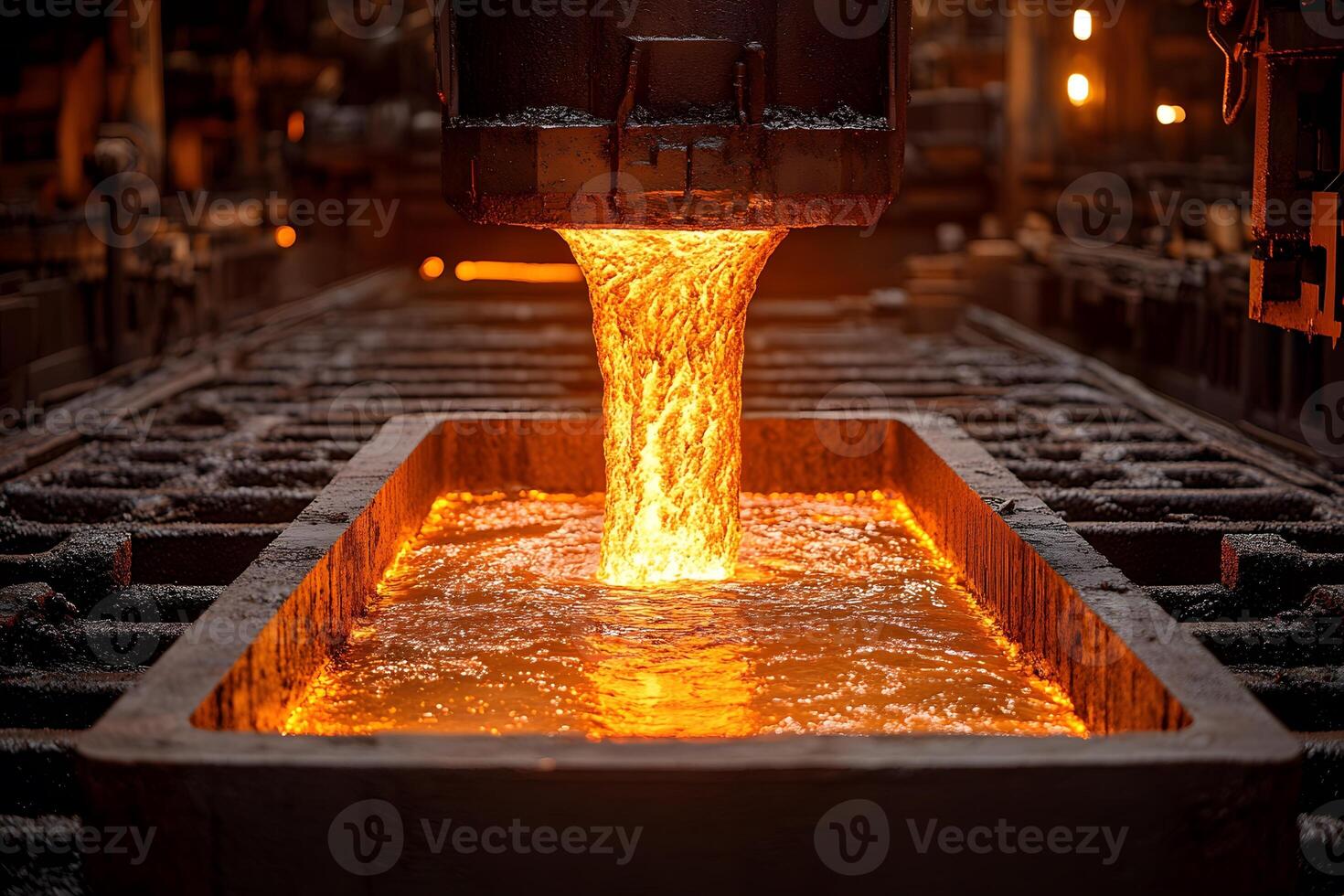Top Technological Advances Transforming the Metal Foundry Landscape
Wiki Article
A Comprehensive Overview to Metal Casting: Benefits and Providers Used by Foundries
Metal casting is a crucial procedure in various industries, supplying numerous advantages through the solutions of foundries. These facilities change molten metal into specific and durable elements, catering to details customer requirements. By utilizing innovative innovations, factories assure high quality and performance in production. The intricacies of metal casting and the varied strategies entailed raise important concerns about its function in modern production. What developments lie ahead in this important field?Recognizing the Metal Casting Process
The metal casting procedure is an essential strategy made use of in manufacturing to produce complicated shapes and elements. This method entails putting liquified metal into a mold developed to develop the preferred things. The procedure begins with pattern production, which works as a design template for the mold. Metal Foundry. Various materials, such as sand, metal, or ceramic, are used for mold-making, relying on the particular needs of the casting
When the mold is ready, molten metal is poured right into it and permitted to strengthen and cool down. After solidification, the mold is gotten rid of, exposing the actors component. Numerous methods, including sand casting, financial investment casting, and die casting, are utilized, each fit to different applications and products. Quality control measures, such as examinations and screening, are necessary to assure the last product satisfies specifications. Overall, the metal casting procedure plays a vital duty in producing components for industries varying from automotive to aerospace.
Trick Benefits of Metal Casting
Metal casting offers considerable advantages that make it a recommended production method in various sectors. Its design flexibility and accuracy permit complex shapes, while cost-effective automation enhances efficiency. In addition, the convenience and stamina of materials used in casting add to the longevity of the end products.Style Versatility and Precision
Releasing exceptional style flexibility and precision, metal casting permits developers and engineers to create detailed shapes and functions that would be difficult or challenging to accomplish with various other producing methods. This capacity enables the production of complex geometries, interior structures, and great information that enhance item functionality and aesthetic appeals. Additionally, different casting strategies, such as sand casting, financial investment casting, and pass away casting, supply more options for personalization, accommodating varied material residential or commercial properties and task demands. The versatility of mold and mildews allows adjustments during the style stage, improving the change from concept to final product. Ultimately, metal casting stands out for its ability to deliver high-precision parts, making it an indispensable process in sectors varying from automotive to aerospace and beyond.Cost-efficient Mass Manufacturing
Cost-effective mass manufacturing stands as one of the primary advantages of metal casting, making it possible for makers to produce huge amounts of parts at a lower cost per unit. This performance develops from the capability to produce intricate molds that can be recycled numerous times, considerably lowering configuration and operational prices. In addition, metal casting procedures, such as sand casting and die casting, allow for high throughput, making it possible to fulfill the needs of massive manufacturing runs. The minimized product waste and energy usage even more boost cost financial savings, making metal casting an appealing choice for industries requiring bulk elements. Overall, the cost-effective nature of metal casting positions it as a favored technique for suppliers going for financial effectiveness in their production processes.Product Versatility and Strength
One of the standout features of metal casting is its exceptional product flexibility, which permits the usage of a vast array of metals and alloys. This adaptability enables makers to choose products that finest suit their details applications, from light weight aluminum and bronze to iron and steel. Each metal supplies unique residential properties, consisting of differing degrees of toughness, corrosion resistance, and thermal conductivity. Consequently, metal casting can generate parts that satisfy rigid performance demands throughout diverse markets, such as automotive, aerospace, and construction. Furthermore, the stamina of actors metals can be improved via different treatment processes, making certain durability and long life. Metal Foundry. In general, the combination of product versatility and integral stamina makes metal casting a recommended selection for producing top quality elementsTypes of Metal Casting Techniques
Metal casting includes a selection of techniques that deal with various manufacturing demands and product residential or commercial properties. Common techniques include sand casting, which utilizes a sand mold and mildew for complicated forms, and investment casting, recognized for its precision and surface finish. Die casting is one more method that utilizes high-pressure shot of liquified metal into mold and mildews, ideal for automation of small components.Covering molding offers a much faster alternative, utilizing a resin-coated sand to produce thin-walled molds, while shed foam casting allows for intricate styles without the requirement for a core.
In addition, continual casting is used for generating long sections of metal, such as bars or sheets, by solidifying molten metal in a continuous procedure. explanation Each method offers one-of-a-kind advantages and is chosen based upon elements like the needed detail, manufacturing volume, and product type, making certain remarkable outcomes in metal fabrication throughout different sectors.
The Function of Foundries in Metal Casting
Foundries play an essential duty in the metal casting process, functioning as the centers where molten metal is changed into ended up items. These specialized facilities are furnished with the necessary tools and innovations to take care of various metals, making sure premium outcomes. Foundries are in charge of numerous important functions, consisting of thawing the metal, pouring it into mold and mildews, and allowing it to strengthen.Furthermore, they preserve rigorous security and ecological requirements to shield employees and lessen environmental effect. Competent technicians and engineers work together to optimize casting procedures, boosting effectiveness and decreasing waste. Foundries also engage in high quality control actions, making certain that the last products satisfy certain resistances and specs. This quality control is vital for industries that rely on specific components, such as automobile and aerospace. As an outcome, shops contribute significantly to the general production landscape, making it possible for development and growth across various industries.
Personalized Metal Casting Solutions
Custom-made metal casting services provide tailored design solutions that meet details client needs. These services also offer material option expertise, making certain the ideal metal is chosen for the desired application. Such flexibility and expertise improve the total quality and performance of the end product.
Tailored Design Solutions
Tailored layout services in metal casting provide manufacturers with the adaptability to create elements that fulfill details efficiency i loved this and aesthetic demands. Shops supply customized solutions that enable clients to define measurements, forms, and surface area coatings to attain wanted results. This customization process typically includes cooperation in between engineers and designers, making sure that the final items line up with operational requirements and market standards. Advanced innovations, such as computer-aided layout (CAD) and simulation software application, enable precise modeling and screening of parts before manufacturing, boosting and reducing mistakes efficiency. By leveraging customized style options, businesses can optimize functionality while decreasing waste and expenses, ultimately causing a much more affordable edge out there. This versatility is vital for markets calling for special applications and requirements.Product Option Proficiency
When picking materials for metal casting, proficiency plays a vital function in making sure that the appropriate choice straightens with both performance requirements and cost-effectiveness. Shops employ knowledgeable experts who comprehend the residential properties of various metals and alloys, allowing them to suggest suitable materials for particular applications. Factors such as strength, corrosion resistance, and thermal conductivity are carefully thought about to meet the customer's requirements. Additionally, industry patterns and innovations in material science educate these decisions, making it possible for shops to remain affordable. By leveraging their knowledge, factories can aid clients in guiding with complicated material alternatives, eventually bring about enhanced product high quality and lowered production expenses. This specific expertise is crucial for accomplishing successful results in customized metal casting services.Quality Assurance in Metal Casting
Quality assurance in metal casting is important to ensure that the final items fulfill the called for specifications and performance requirements. Factories utilize a variety of methods and strategies to assure the finest of actors parts. This process starts with rigorous material evaluations, confirming that resources adhere to sector requirements. Throughout the casting procedure, real-time tracking and screening are carried out to examine criteria such as temperature, mold and mildew stability, and dimensional precision.
Applications of Metal Castings Across Industries
Metal spreadings play an important duty in various sectors, functioning as the foundation for plenty of applications. In the auto market, cast elements such as engine blocks and transmission real estates are essential for automobile performance and integrity. The aerospace market counts on accuracy spreadings for important elements that guarantee safety and security and performance in trip. In addition, the construction industry utilizes metal castings for fixtures, installations, and structural aspects, boosting the toughness of structures and facilities.Furthermore, the power industry take advantage of castings used in turbine blades and other tools necessary for power generation - Metal Casting. The medical area likewise uses metal castings in gadgets and tools, showing the convenience of this production procedure. On the whole, metal castings are essential to the performance and improvement of diverse sectors, showcasing their value in modern-day innovation and infrastructure advancement
Often Asked Questions
What Products Are Frequently Utilized in Metal Casting?
Common materials made use of in metal casting consist of aluminum, iron, bronze, steel, and brass. Each material supplies special residential or commercial properties appropriate for different applications, permitting producers to choose the very best choice based on toughness, deterioration, and weight resistance.Exactly how Lengthy Does the Metal Casting Process Usually Take?
The metal casting process generally takes a number of hours to a few days, depending on variables such as the intricacy of the design, sort of metal made use of, and the details casting approach used by the factory.
What Is the Ecological Influence of Metal Casting?
The ecological influence of metal casting consists of power intake, emissions, and waste generation. Shops commonly carry out steps to minimize these results, such as top article recycling products and using cleaner modern technologies to lower their eco-friendly impact.Can Metal Casting Be Done for Small-Scale Projects?
Metal casting can certainly be carried out for small-scale jobs. Different foundries deal with such requirements, using tailored services that accommodate restricted production runs while maintaining high quality and precision in the final products.What Are the Safety Measures in Metal Casting Foundries?
In metal casting shops, safety procedures consist of individual safety devices, correct ventilation, training on tools usage, emergency procedures, routine upkeep checks, and adherence to industry security standards to lessen risks linked with molten metal and unsafe materials.In addition, metal casting procedures, such as sand casting and pass away casting, permit for high throughput, making it viable to meet the needs of large manufacturing runs. One of the standout features of metal casting is its remarkable material versatility, which permits for the usage of a large range of alloys and metals. In addition, continuous casting is used for generating lengthy sections of metal, such as bars or sheets, by strengthening molten metal in a continual procedure. Factories play a pivotal duty in the metal casting procedure, offering as the facilities where molten metal is changed into ended up products. Usual products utilized in metal casting consist of aluminum, iron, bronze, brass, and steel.
Report this wiki page